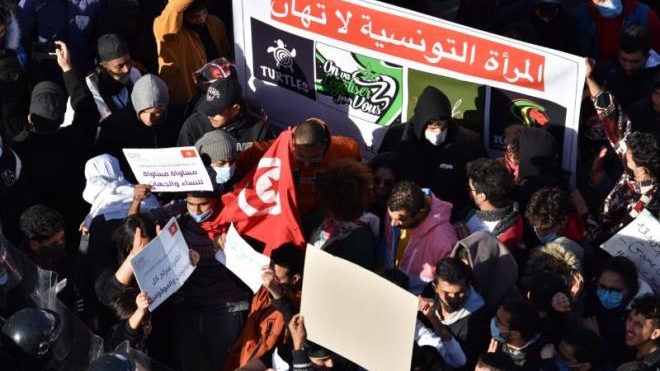Hundreds of protesting Tunisian citizens faced violent action from the security forces in the city of Tataouine in southern Tunisia on Tuesday, March 30 while demonstrating against unemployment in the region and the government’s inaction to provide them with jobs, Middle East Eye reported.
The protesters were reportedly trying to enter a government building in the city with the intention of staging a sit-in to demand the resignation of the governor. The police blocked them by firing tear gas canisters and subsequently chased them away, breaking up the protest. The protesters in retaliation threw stones at the police and burnt tires on the road.
The protesters were demanding the government to implement a long overdue deal from 2017 which promised to create jobs in the oil and infrastructure sectors in the region to tackle the issue of unemployment. The deal was reached after widespread protests in 2017 in the Tataouine and Kebili provinces against the acute shortage of jobs in the oil and natural gas production sectors of the region, which were dominated by French company Perenco and Austrian company OMV. However, the government has reportedly failed to implement the deal in the last four years. As a result, the unemployment rate in the region has risen drastically, currently at 30% – among the highest in the country.
Tuesday’s protests were the latest in a series of protests over the last few years against various economic and political issues affecting Tunisia. Widespread protests against the deteriorating economy and government’s neglect and apathy towards the poor, working class and marginalized sections have been regularly taking place in the country. Protests against state repression and violent crackdowns by the security forces have also been registered. The Tunisian government has tried to suppress these protests through intimidation, arrests and state prosecution of thousands of protesters. At least one protester was killed in the month of January.
Even as millions of Tunisians continue to suffer, the government and the political class has been engaged in political squabbles over cabinet reshuffles and the sharing of executive power. The recent highly public feud between Tunisian president Kais Saied and prime minister Hichem Mechichi threatened to plunge the country into further socio-economic and political turmoil.





